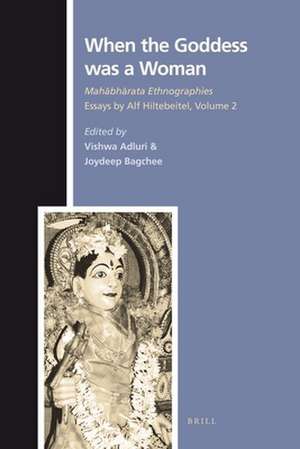When the Goddess was a Woman: Mahābhārata Ethnographies - Essays by Alf Hiltebeitel, volume 2: Numen Book Series / Texts and Sources in the History of Religions, cartea 132
Vishwa Adluri, Joydeep Bagcheeen Limba Engleză Hardback – 26 iul 2011
This two volume edition collects nearly three decades of Alf Hiltebeitel’s researches into the Indian epic and religious tradition. The two volumes document Hiltebeitel’s longstanding fascination with the Sanskrit epics: volume 1 presents a series of appreciative readings of the Mahābhārata (and to a lesser extent, the Rāmāyaṇa), while volume 2 focuses on what Hiltebeitel has called “the underground Mahābhārata,” i.e., the Mahābhārata as it is still alive in folk and vernacular traditions. Recently re-edited and with a new set of articles completing a trajectory Hiltebeitel established over 30 years ago, this work constitutes a definitive statement from this major scholar. Comprehensive indices, cross-referencing, and an exhaustive bibliography make it an essential reference work. For more information on the first volume please click here.
Preț: 1161.99 lei
Preț vechi: 1417.06 lei
-18% Nou
Puncte Express: 1743
Preț estimativ în valută:
222.42€ • 241.68$ • 186.95£
222.42€ • 241.68$ • 186.95£
Carte indisponibilă temporar
Doresc să fiu notificat când acest titlu va fi disponibil:
Se trimite...
Preluare comenzi: 021 569.72.76
Specificații
ISBN-13: 9789004193802
ISBN-10: 9004193804
Pagini: 672
Dimensiuni: 160 x 240 x 41 mm
Greutate: 1.2 kg
Ediția:New.
Editura: Brill
Colecția Brill
Seria Numen Book Series / Texts and Sources in the History of Religions
ISBN-10: 9004193804
Pagini: 672
Dimensiuni: 160 x 240 x 41 mm
Greutate: 1.2 kg
Ediția:New.
Editura: Brill
Colecția Brill
Seria Numen Book Series / Texts and Sources in the History of Religions
Notă biografică
Vishwa Adluri, Ph.D. (2002) in Philosophy, New School for Social Research, teaches in the Departments of Philosophy and Religious Studies at Hunter College, City University of New York. He has published extensively on ancient philosophy, Indian philosophy, and religion. His work mainly explores the epic traditions (both Greek and Indian). Recent and forthcoming publications include Parmenides, Plato, and Mortal Philosophy: Return from Transcendence (Continuum Publishing) and the edited volume Greek Religion: Philosophy and Salvation (De Gruyter, forthcoming). An edited volume on the Mahabharata is currently under preparation at BORI. He is currently working on a monograph on German Indology (co-authored with Joydeep Bagchee) titled The Nay Science: A History of German Indology.
Joydeep Bagchee, Ph.D. (2009) in Philosophy, New School for Social Research, is a post-doctoral fellow at Marburg University, Germany and has interests in Heidegger, Indian philosophy, and the Bhagavad G¯ıt¯a. He is currently completing a monograph on the history of reception of Indian thought in Germany (The Nay Science: A History of German Indology). In addition, he has published numerous articles and reviews on Indian philosophy and religion. Bagchee is also the author of two forthcoming translations of Heidegger’s work (Indiana University Press).
Joydeep Bagchee, Ph.D. (2009) in Philosophy, New School for Social Research, is a post-doctoral fellow at Marburg University, Germany and has interests in Heidegger, Indian philosophy, and the Bhagavad G¯ıt¯a. He is currently completing a monograph on the history of reception of Indian thought in Germany (The Nay Science: A History of German Indology). In addition, he has published numerous articles and reviews on Indian philosophy and religion. Bagchee is also the author of two forthcoming translations of Heidegger’s work (Indiana University Press).
Recenzii
"Hiltebeitel effectively demonstrates that the complex of goddess worship in India has a solid basis in the greater Mahābhārata, including the classical, vernacular, and folk versions, which must be viewed as part of an evolving, multifaceted, and equally construed whole." - Frederick M. Smith, University of Iowa, in: Religious Studies Review 38.2 (2012)









